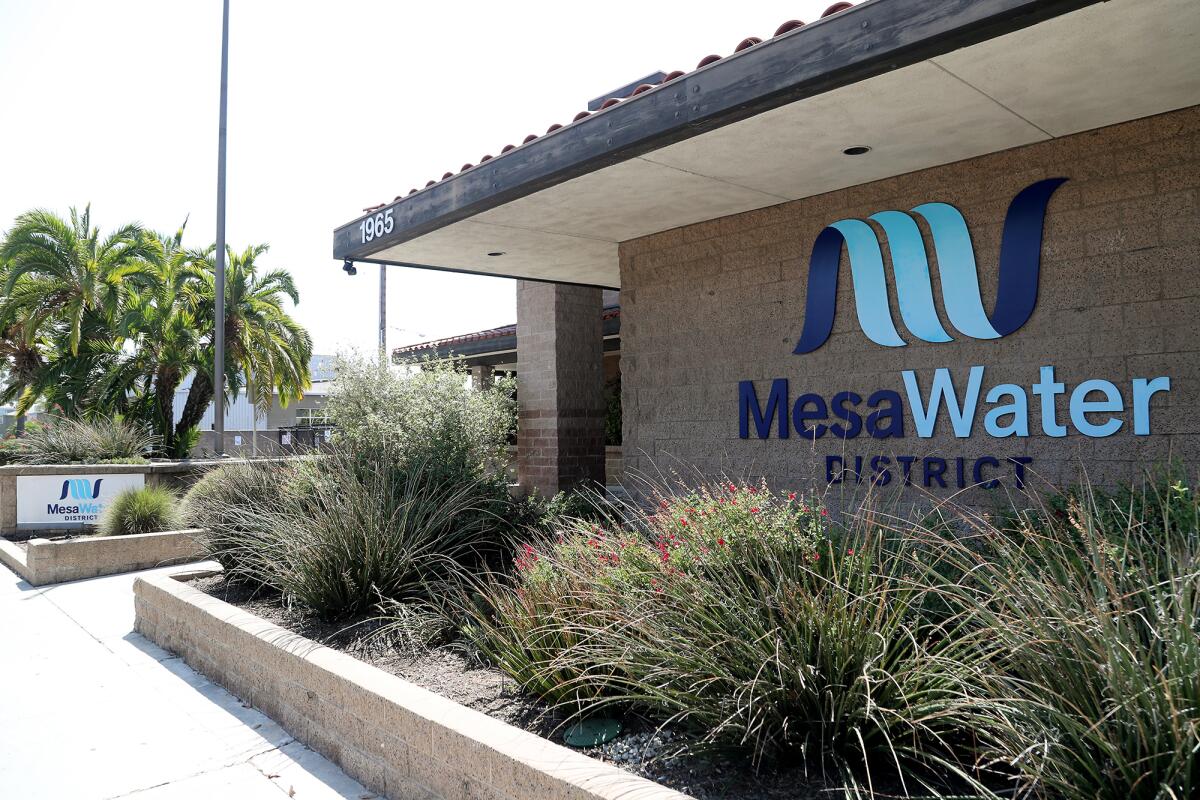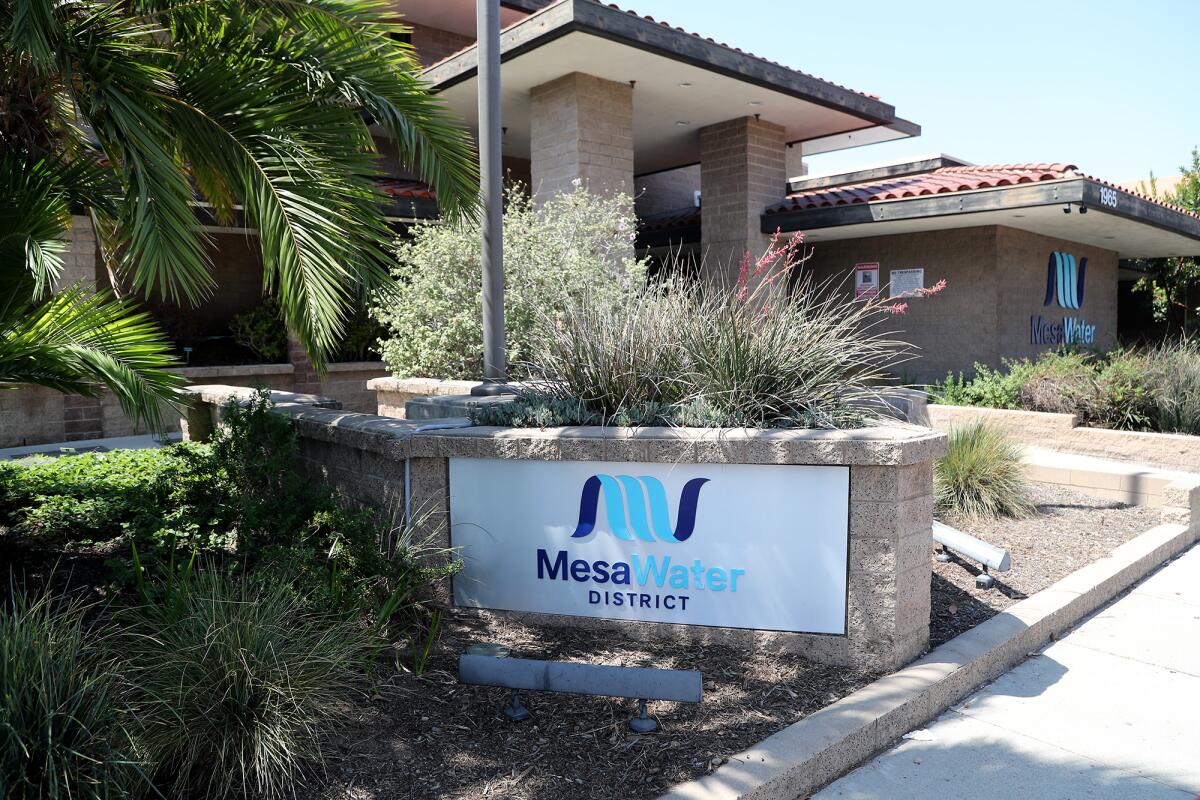Mesa Water District fined by FPPC for ‘campaigning’ in 2016 bid to merge with Costa Mesa Sanitary District

- Share via
Mesa Water District was issued a $14,500 fine earlier this year by the Fair Political Practices Commission for violating campaign transparency and reporting laws and using public funds for advertisements and mailers supporting Measure TT in 2016.
Local voters were asked that November whether they supported Mesa Water’s merging with the Costa Mesa Sanitary District, a move the former claimed would grant customers a one-time rebate of $650 and an annual 28% savings on sewer rates. The nonbinding measure was approved by 54.7% of voters.
There was just one hitch — Costa Mesa Sanitary District officials were strongly opposed to a merger, which they considered a hostile takeover.
Then-sanitary district board president Mike Scheafer penned an Oct. 24, 2016, letter of complaint on behalf of the board to the FPPC, the agency responsible for policing campaign finance in California.
The letter alleged a series of mailers and newspaper advertisements paid for and issued by Mesa Water District leading up to the election, including two print ads in the Daily Pilot, unfairly biased voters in favor of Measure TT.

“Verbiage related to purported savings from a proposed consolidation was in a bold font, clearly distinguishing it from the remainder of the text and contrary to how it appears in the voter information pamphlet,” the letter stated. “We believe this to be a clear violation. We appreciate your swift investigation into this complaint.”
This May — more than three years after the original complaint — commission officials determined Mesa Water District violated portions of the Political Reform Act when it spent $42,151.40 of public funds on unreported campaign activities.
Carla Valenzuela stood out among hundreds of candidates to helm Costa Mesa Chamber of Commerce, said former president and chief executive Eileen Benjamin, who praised her successor’s acumen and grace.
A stipulation document prepared by commission counsel Ruth Yang and Galena West, chief of enforcement, and approved by commissioners during a May 21 meeting laid out the facts of the case.
The Political Reform Act considers any local government agency that spends $1,000 or more in public funds advocating for or against a ballot measure to be a campaign committee, obligated to disclose and report its expenditures, the document explained. It went on to describe the four violations:
“The District violated the Act by sending prohibited campaign related mass mailings at public expense, failing to include a disclosure statement on advertisements, failing to timely file eight 24-hour independent expenditure reports and failing to timely file one semi-annual campaign statement,” it continued.
Commission officials ordered Mesa Water to pay $14,500 in fines, indicating the agency could have been penalized up to $141,454, for the number and nature of infractions committed.
Mesa Water District General Manager Paul Shoenberger said by email Friday Measure TT outreach materials were vetted through attorneys to ensure regulatory compliance.
“Mesa Water genuinely believed the materials to be educational — the Fair Political Practices Commission disagreed,” he said. “[The district] could have fought the stipulation but at a cost far greater than the nominal amount they were asking for.”
Shoenberger defended the agency’s pursuit of a merger with the Costa Mesa Sanitary District, referring to a study conducted by consultant Arcadis U.S. that determined consolidating the two special districts could save $15.6 million in one-time costs and $2.7 million annually.
Still, he said, the district won’t take future steps so long as the sanitary district remains opposed.
“Because Mesa Water supports collaborative consolidations, we will not pursue the potential efficiencies until CMSD wishes to explore optimal governance structures,” Shoenberger added.
Scheafer, who still serves on the sanitary district board of directors, said his agency believes Mesa Water’s study findings were flawed and inaccurate. In June 2017, CMSD sued the water district to obtain documents pertaining to the study — the suit was dropped when two parties reached a settlement agreement in July 2018.
Scheafer said it’s unlikely the district would consider a merger without a recommendation from the Orange County Local Agency Formation Commission (LAFCO), which determines special district boundaries.
“If LAFCO were to come to us and say, ‘It doesn’t make sense for you to exist,’ then we’d have to consider that” Scheafer added. “But we’re not comfortable with any agency coming in and making a hostile takeover of our agency.”
Since the settlement agreement, the two special districts have maintained separate operations. In July, Mesa Water was reaccredited as a “District of Distinction” by the Special District Leadership Foundation for its “ongoing commitment to transparency and accountability.”
Meanwhile, another open FPPC case remains under investigation, this time against the sanitary district. Filed on Oct. 13, 2017, at the commission’s own initiative, the matter involves a fall 2016 newsletter CMSD distributed before the November election. It contained an article revealing Mesa Water’s Measure TT expenditures and depicted an image of $100 bills circling a drain.
In a “CMSD Awards” section, the newsletter noted that, like Mesa Water, it had also been accredited as a “District of Distinction” in 2009, 2012, 2014 and 2016 — the same year in which the activities under investigation occurred.
FPPC spokesman Jay Wierenga said Friday commission officials could not comment on open investigations.
All the latest on Orange County from Orange County.
Get our free TimesOC newsletter.
You may occasionally receive promotional content from the Daily Pilot.





